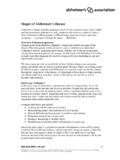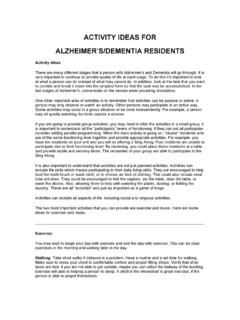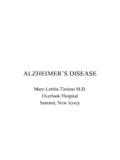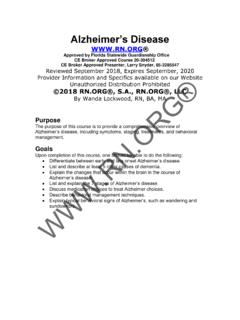Transcription of WHAT IF THERE WAS A CURE FOR ALZHEIMER’S …
1 WHAT IF THERE WAS A CURE FOR alzheimer S disease AND NO ONE KNEW?A Case Study by Dr. mary newport July 22, 2008 THERE is a growing epidemic of obesity, type II diabetes, cardiovascular disease , and predictions that 15,000,000 people in the United States alone will have Alzheim-er s disease by the year 2050. In 2001, Dr. Richard L. Veech of the NIH, and others, published an article entitled, Ke-tone bodies, potential therapeutic uses. 1 In 2003, George F. Cahill, Jr. and Richard Veech authored, Ketoacids? Good Medicine? 2 and in 2004, Richard Veech published a review of the therapeutic implications of ketone These articles are not found in journals that the average physician would read, much less the lay public.
2 Unless you are research-ing the topic, it is unlikely that you would ever randomly come across this information. My husband Steve, age 58, has had pro-gressive dementia for at least five years. He had an MRI in May 2008 showing a diffuse involutional change of the frontal and pari-etal lobes and moderate left-sided and severe right-sided amygdala and hippocampal atro-phy with no ischemic change, which would support a clinical diagnosis of alzheimer s disease . For non-medical people, this means that he has shrunken areas of the brain. Many days, often for several days in a row, he was in a fog; couldn t find a spoon or re-member how to get water out of the refrig-erator.
3 Some days were not so bad; he almost seemed like his former self, happy, with his unique sense of humor, creative, full of ideas. One day I would ask if a certain call came that I was expecting and he would say, No. Two days later he would remember the message from so-and-so from a couple of days earlier and what they said. Strange to have no short-term memor y and yet the information was filed somewhere in his brain. My gut feeling is that diet has something to do with the fluc-tuation, but what. I knew that he was locked up in THERE somewhere, if only THERE was a key to open up the areas of his brain that he didn t have access to.
4 Steve has a BSBA in accounting, and did billing, bookkeeping and accounting for my neonatology practice from home, so that he could stay with our girls. He loved computers and was a fast typist. He could open comput-ers up to repair them and fix practically any-thing else without ever having instruction. If he did not have a tool to do something he would invent it and make a usable proto-type. He loved to kayak and made an attach-ment to keep his kayak moving in a straight line. About five years ago he began to have trouble organizing to do his accounting work.
5 He would procrastinate as much as possible. He made mistakes with the payroll and I be-gan to sit with him to help him get it right. I thought it was just that our practice had got-ten more complicated with more employees. He knew that something was wrong and depression set in. We took him to a neurologist about 4 years ago, who did a Mini Mental Status Exam (MMSE,) and Steve scored a 23 out of 30, putting him into the mild range of dementia. On this test, the lower the score is, the worse the dementia. His MRI was reported as normal at that time. About three years ago, Steve started taking Aricept and two years ago Namenda.
6 We were hopeful that, if we could slow his decline enough, a treatment would come along that would turn things around for him. He was changed over from Aricept to Exelon in August 2007 after losing ten pounds over several weeks. In the past 12 months THERE was a noticeable change. He can no longer cook for himself, remember to eat a good meal, use a calculator or even perform the simplest addition, however he still keeps busy all day working in the yard or in his garage and he is still in good physical condition. I now do all the cooking for a man who used to cook for his family regularly.
7 I give him the medications because he can t remember to take them, much less take the right pills. Ever y night, we hold each other before we go to sleep and I won-der how many more times we will get to do this. It has been a nightmare to watch his decline and feel helpless to do anything but watch it happen. He is fully aware of his dementia, and we talk about it fre-quently. He is no longer depressed, probably with the help of counseling, Lexipro and Wellbutrin, or maybe worsening of his disease . I subscribe to various alerts and check the website periodically to look for drug studies that he may qualify for.
8 Two years ago we tried to get him into a study for a promis-ing anti-inflammator y drug, Flurizan, but he did not qualify because he had a histor y of depression within the previous two years. Wouldn t you be de-pressed if you knew you had alzheimer s? In fact, depression may be a symptom or precursor of Al-zheimer s. Until ver y recently, I didn t see anything re-garding the potential use of medium chain trig-lycerides (MCT oil), or ketone bodies (also called ketoacids,) the end product of their metabolism, which may not only treat, but also prevent Alzheim-er s disease .
9 Further, this is a potential treatment for Parkinson s disease , Huntington s disease , multiple sclerosis and amyotrophic lateral sclero-sis (ALS or Lou Gehrig s disease ), drug resistant epilepsy, brittle type I diabetes, and diabetes type II, where THERE is insulin resistance. Ketone bodies may help the brain recover after a loss of oxygen in newborns through adults, may help the heart re-cover after an acute attack, and may shrink cancer-ous tumors. Children with drug resistant epilepsy sometimes respond to an extremely low carbohy-drate ketogenic diet.
10 MCT oil appears to be useful as an aid in weight loss and body builders use it already to improve their lean body mass (MCT oil can be easily purchased on the internet.) Athletes and soldiers could use MCT oil as a source of fuel when the body runs out of carbohydrates, which occurs rather quickly when food is not readily available. What do these entities have in common? Our cells can use ketone bodies as an alternative fuel when glucose is not available. Brain cells, specifi-cally neurons, are ver y limited, more limited than other cells, in what kinds of fuel they can use to function and to stay alive.





